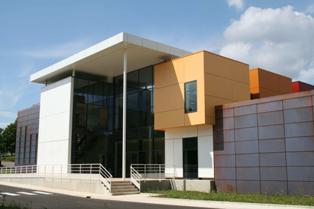New laboratories to study plant ageing
19 November 2009
Electricité de France (EdF) has inaugurated new laboratories at the Materials Ageing Institute (MAI), which will examine the link between materials science and power plant component performance and degradation.
 |
| The Materials Ageing Institute's facilities (Image: MAI) |
The new MAI laboratories at EdF's its Les Renardières research and development facilities in Moret-sur-Loing, some 60 km southeast of Paris, were inaugurated by Yves Bamberger, senior vice president corporate EdF R&D, and Bernard Dupraz, executive vice president EdF Production. Some 150 utility managers, directors, project leaders, scientists, journalists and politicians attended the event.
MAI was founded in January 2008 by EdF, together with Japan's Tokyo Electric Power Co (Tepco) and the Electric Power Research Institute (EPRI) of the USA. It aims to bring together the needs and skills of industrial companies focussing on the ageing of materials used in existing and future nuclear, fossil-fired and hydroelectric generating plants.
In a statement, EdF said: "The MAI represents half the world’s nuclear power station operators and concentrates its current research on the development of knowledge and models to help its members improve the management of their power station operating life, a problem shared by all nuclear electricity generators worldwide."
Run by EdF, the research institute has 80 researchers, engineers and technicians, and an annual budget of €9 million ($13.5 million). EdF contributes at least 50% of MAI's operating budget. The company also financed the entire initial investment in MAI, including the cost of constructing and equipping the new facilities. These costs were put at $22.3 million when MAI was launched early last year.
MAI will focus on three main areas of work: the microscopic observation of materials and experiments on specially developed specimens; modelling using mathematical models to confirm the understanding of fundamental process, such as stress corrosion, fatigue and creep, and to evaluate the longevity of components and materials; and, operational experimentation, using both digital simulation and operational data from samples of materials from power station operations and from the replacement of specific components.
Areas of interest for MAI within nuclear power plants include the reactor vessel, the primary and secondary circuits, plastics and polymeric material used for electric cables and coating of components, as well as the concrete structures of the plant.
The new MAI building will house a Titan Transmission Electron Microscope (TEM) microscope, currently the most powerful in the world. Other laboratories within MAI have very high performance computing resources, such as an IBM Blue Gene/L supercomputer with 8000 processors.
The institute also organizes short courses, seminars and workshops for utility engineers who seek basic or advanced knowledge in material ageing.